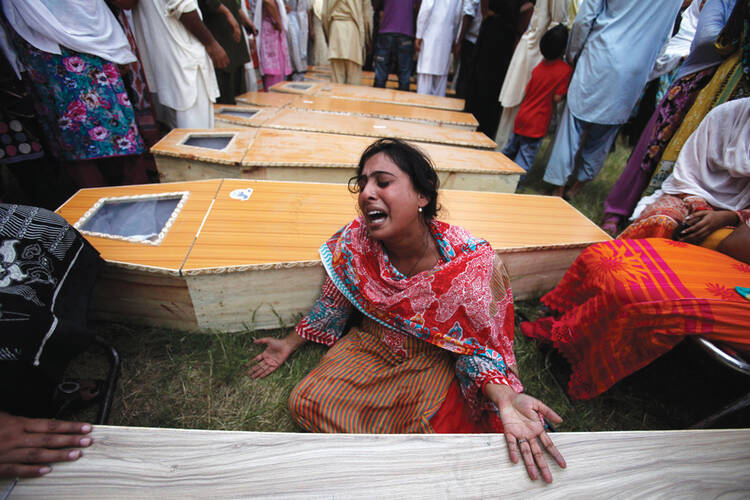The Vatican’s representative at the United Nations told a congressional panel on Feb. 11 that “flagrant and widespread persecution of Christians rages in the Middle East even as we meet.” Archbishop Francis A. Chullikatt has witnessed the violence firsthand. Before taking his post as permanent observer of the Holy See to the United Nations, Archbishop Chullikatt served as apostolic nuncio to Iraq and Jordan and lived in Baghdad from 2006 to 2010.
“This tragedy is all the more egregious when one pauses to consider that these men and women of faith...have been living at peace with their neighbors for untold generations,” the archbishop told the committee. Chaired by Representative Chris Smith, Republican of New Jersey, the House subcommittee on global human rights listened to Archbishop Chullikatt and other international experts testify about the rise in Christian persecution throughout the world.
The persecution of Christians in Iraq has increased in the wake of the country’s democratic transition. There and in other nations where hostility to Christians is on the rise, religious minorities had enjoyed some protection under the strict law and order enforced by previous rulers. Archbishop Chullikatt said that today, “because of the conflict, Christians are caught in the crossfire.”
He denounced the emerging “tradition” of bombing Catholic and other Christian churches on Christmas Eve, which has occurred in the Middle East for several years. When Smith asked Archbishop Chullikatt about the effect of persecution on children, the archbishop indicated that the damage is immense. “They live in fear...they go to schools, not even sure they will come back safe and alive.”
The archbishop also expressed concern for the future. “This is the kind of formation we are giving to the young generations who will become leaders,” he said. “It is a painful thing.”
The persecution of Christians is not limited to the Middle East. The Pew Forum found that Christians suffered some form of harassment in 139 countries between 2006 and 2010, more than any other group. Other speakers at the hearing testified about violence against Christians in Indonesia, Vietnam, Nigeria, Myanmar, Sudan and Eritrea, among other states. Conversion laws in India, restrictions on worship in China and denial of education or employment in various countries were cited as other forms of persecution against the world’s Christians.
John Allen, associate editor of The Boston Globe and author of The Global War on Christians, said many ignore the issue because of outdated prejudices. “Say ‘religious persecution’ to most Westerners, and the images that come to mind are the Crusades, the Inquisition, the wars of religion,” Allen said.
“The typical Christian in today’s world is not an affluent American male pulling up to church in a Lincoln Continental,” Allen said, “it’s a poor black woman and mother of four in Botswana.” Allen noted that two thirds of the world’s Christians live outside of the West, and more than half that number live in poverty.
When Western governments like the United States defend persecuted Christians internationally, their voice carries weight. Elliott Abrams of the U.S. Commission on International Religious Freedom said that the U.S. government needs to say that “we care, and this will affect our relations.”
Abrams said the United States should enforce economic and trade sanctions against countries that persecute religious minorities. “All too often, there are no sanctions, or there is double-padding—the sanctions for religious freedom are tacked on to other sanctions,” said Abrams.








